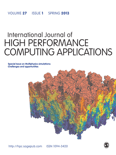
INTERNATIONAL JOURNAL OF HIGH PERFORMANCE COMPUTING APPLICATIONS
Scope & Guideline
Unlocking the Potential of High-Performance Technologies
Introduction
Aims and Scopes
- High-Performance Algorithms and Libraries:
Research on the development and optimization of algorithms and libraries that enhance computational performance, including linear algebra, iterative solvers, and specialized libraries for GPUs and CPUs. - Exascale Computing Solutions:
Focus on methodologies and tools that facilitate exascale computing, addressing challenges such as performance scalability, resource management, and application portability. - Parallel Computing Techniques:
Exploration of parallel computing paradigms, including MPI, OpenMP, and hybrid programming models that leverage multi-core and many-core architectures for improved performance. - Data-Driven Performance Optimization:
Utilization of machine learning and data analysis techniques to optimize performance in high-performance computing environments, including workload characterization and scheduling. - Scientific Application Development:
Development of computational frameworks and methodologies for specific scientific applications, such as climate modeling, fluid dynamics, and molecular dynamics, emphasizing performance and accuracy. - Interdisciplinary Approaches:
Integration of HPC with other fields such as AI, data science, and materials science to address complex computational problems and enhance the capability of scientific simulations.
Trending and Emerging
- Exascale Computing Challenges:
An increasing number of studies are addressing the unique challenges posed by exascale computing, including resource management, performance optimization, and application scalability, reflecting the community's focus on future computing architectures. - Machine Learning and AI Integration:
The integration of machine learning and artificial intelligence into HPC applications is a growing trend, with research exploring how these technologies can enhance performance, automate workflows, and improve decision-making processes. - Heterogeneous Computing Environments:
A significant emphasis on heterogeneous computing, combining CPUs, GPUs, and specialized hardware, is evident, as researchers seek to optimize performance across diverse architectures. - Advanced Visualization Techniques:
Emerging studies focus on advanced visualization techniques for large-scale data generated by HPC applications, enhancing the ability to interpret complex results effectively. - Sustainable and Energy-Efficient Computing:
Research is increasingly directed towards sustainability and energy efficiency in HPC, exploring methods to reduce the carbon footprint and improve the energy performance of high-performance computing systems.
Declining or Waning
- Traditional CPU-based Computation:
There has been a noticeable decrease in research focused solely on traditional CPU-based computing methods, as the shift towards GPU and heterogeneous computing becomes more pronounced. - Basic Numerical Methods:
Research centered on fundamental numerical methods without significant enhancements or optimizations is becoming less common, as the community increasingly emphasizes advanced, application-specific solutions. - Legacy Software Systems:
The study of legacy software systems and their optimization has waned, with a greater emphasis now placed on developing new architectures and programming models tailored for modern HPC environments. - Non-Exascale Applications:
Investigations into non-exascale applications are less frequently published, reflecting a trend towards tackling the challenges presented by exascale computing and its associated complexities. - Generalized Performance Metrics:
Research that focuses on generalized performance metrics without context-specific applications is declining, as more studies emphasize targeted performance improvements for specific applications or architectures.
Similar Journals

Computer Science Journal of Moldova
Connecting Researchers to Shape the Future of TechnologyComputer Science Journal of Moldova, published by the Institute of Mathematics and Computer Science Academy, serves as a pivotal platform for disseminating research in the field of computer science since its inception in 1993. With a focus on a diverse range of subjects, including Artificial Intelligence, Computational Mathematics, and Software Engineering, this open access journal aims to foster innovation and collaboration among researchers, students, and industry professionals. Despite its current positioning in the lower quartiles as per the latest Scopus rankings, the journal remains committed to enhancing the visibility of regional research and addressing contemporary challenges through scholarly contributions. The journal’s open access model ensures that knowledge is freely available, promoting broader readership and impact within the international academic community. As it moves through the converged years from 2019 to 2024, the Computer Science Journal of Moldova continues to aspire toward empowering the next generation of computer scientists while enriching the global dialogue in this rapidly evolving field.
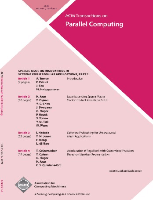
ACM Transactions on Parallel Computing
Unleashing the Power of ParallelismACM Transactions on Parallel Computing (ISSN: 2329-4949; E-ISSN: 2329-4957), published by the Association for Computing Machinery, stands as a pivotal journal in the field of computer science, particularly focusing on the advancements in parallel and distributed computing. With its convergence years spanning from 2014 to 2024, this journal serves as a significant platform for disseminating cutting-edge research, methodologies, and technologies that shape the future of computational theory, hardware architectures, and effective software solutions. Although it currently holds a Q3 category ranking in various subfields including Computational Theory and Mathematics, and Modeling and Simulation, it continues to attract researchers aiming to contribute to its growing impact in the field. The journal's commitment to fostering knowledge exchange makes it an essential resource for professionals and students eager to navigate the complexities of parallel computing. As the field evolves, ACM Transactions on Parallel Computing remains a critical reference point for innovative research and professional development in computer science.
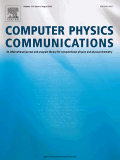
COMPUTER PHYSICS COMMUNICATIONS
Fostering Dialogue in Computer Science and PhysicsCOMPUTER PHYSICS COMMUNICATIONS is a premier journal published by Elsevier, renowned for its contributions to the fields of computer science and physics. With an ISSN of 0010-4655 and an E-ISSN of 1879-2944, this journal has established itself over the decades, beginning its journey in 1969 and running through 2025, fostering innovative research and discussions. Recognized for its high impact, it sits in the Q1 quartile for both Hardware and Architecture as well as for miscellaneous Physics and Astronomy, underscoring its significance in the academic community. The journal's Scopus rankings further reflect its prestige, with a rank of #12 out of 177 in Computer Science and #18 out of 243 in Physics and Astronomy, placing it in the top percentiles of its field. Although it does not currently offer Open Access options, COMPUTER PHYSICS COMMUNICATIONS remains a vital resource for researchers, professionals, and students seeking to advance their knowledge and contribute to the ongoing dialogue in computer physics and its myriad applications.

Journal of Cloud Computing-Advances Systems and Applications
Unveiling the Power of Cloud ApplicationsThe Journal of Cloud Computing - Advances Systems and Applications, published by Springer, serves as a premier platform for disseminating cutting-edge research in the fields of cloud computing, computer networks, and software technologies. With an impressive impact factor and ranked in the top quartile for Computer Networks and Communications and Software categories in 2023, this open access journal has gained significant recognition within the academic community since its establishment in 2012. The journal not only provides valuable insights into innovative applications and advancements in cloud technologies but also supports collaboration among scholars, practitioners, and industry leaders. Operating from the vibrant hub of New York City, it boasts a robust international readership, ensuring that the latest findings reach a diverse audience. Authors and researchers are encouraged to engage with this vital resource, which is dedicated to exploring the transformative potential of cloud computing across multiple disciplines.

BIT NUMERICAL MATHEMATICS
Catalyzing Breakthroughs in Mathematical Applications.BIT Numerical Mathematics, published by Springer, is a prestigious journal in the field of Applied Mathematics and Computational Mathematics, with an ISSN of 0006-3835 and an E-ISSN of 1572-9125. Since its inception in 1961, the journal has become a cornerstone for researchers and practitioners alike, offering high-quality articles that advance the understanding and application of numerical methods in various domains. With its impressive 2023 rankings in the Q1 category for multiple disciplines—including Applied Mathematics, Computational Mathematics, Computer Networks and Communications, and Software—the journal consistently showcases significant contributions to the mathematical community. Although it does not offer Open Access, BIT Numerical Mathematics continues to reach a vast audience through its rigorous peer-reviewed content. As it converges towards 2024, the journal remains committed to publishing cutting-edge research that addresses fundamental challenges in numerical analysis and algorithm development, ensuring its relevance in an ever-evolving scientific landscape.

JOURNAL OF SUPERCOMPUTING
Unraveling the Complexities of Theoretical Computer ScienceJOURNAL OF SUPERCOMPUTING is a premier academic journal published by SPRINGER, situated in the Netherlands, that has made significant contributions to the fields of computer science, particularly in hardware and architecture, information systems, software, and theoretical computer science. With a robust publication history spanning from 1987 to 2024, this journal has cultivated a strong reputation, evidenced by its Category Quartiles ranking in the Q2 category across multiple relevant domains in 2023. The journal's Scopus rankings further underscore its influence, boasting a 78th percentile in mathematics and theoretical computer science, revealing the high quality of research disseminated within its pages. As vital discourse unfolds in the realm of supercomputing—where innovative techniques and technologies rapidly evolve—this journal serves as a crucial platform for researchers, professionals, and students to explore cutting-edge studies and build upon the foundations of knowledge in this dynamic field.

Communications on Applied Mathematics and Computation
Empowering Innovation Through Mathematical InsightsCommunications on Applied Mathematics and Computation is a distinguished journal published by SpringerNature, dedicated to advancing the fields of Applied Mathematics and Computational Mathematics. With its ISSN 2096-6385 and E-ISSN 2661-8893, the journal has established itself as a critical platform for researchers seeking to disseminate their findings and engage with contemporary mathematical challenges. Recognized in the Q2 quartile of both Applied Mathematics and Computational Mathematics categories for 2023, it ranks impressively within its field, holding the 278th position in a pool of 635 journals for Applied Mathematics and the 89th out of 189 for Computational Mathematics, indicative of its scholarly impact. The journal facilitates open access to a plethora of pioneering research, promoting collaboration and innovation in a global academic community. With a commitment to high-quality publications from 2019 through 2024, Communications on Applied Mathematics and Computation serves as an essential resource for scholars and practitioners aiming to bridge theory and practical applications in mathematics.
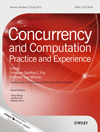
CONCURRENCY AND COMPUTATION-PRACTICE & EXPERIENCE
Fostering Collaboration in Computational ExcellenceCONCURRENCY AND COMPUTATION-PRACTICE & EXPERIENCE, published by Wiley in the United Kingdom, serves as a pivotal platform for advancing research and innovation in the fields of computational theory, computer networks, and practical applications of computer science. With an impressive impact factor and recognition in the Q2 category for disciplines such as Computational Theory and Mathematics, this journal attracts a diverse range of scholarly articles that address the current challenges and developments in these areas. It boasts a comprehensive viewership with options for Open Access, enabling wide dissemination of knowledge. Indexed by Scopus with notable rankings in multiple categories, including a remarkable position in Computational Theory and Mathematics (Rank #41/176), the journal not only elevates academic discourse but also fosters collaboration among researchers, professionals, and students alike. As it progresses toward its 2024 milestone, CONCURRENCY AND COMPUTATION-PRACTICE & EXPERIENCE remains dedicated to publishing high-quality research that prepares its readership for the evolving technological landscape.
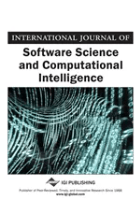
International Journal of Software Science and Computational Intelligence-IJSSCI
Fostering Innovation in Computational IntelligenceInternational Journal of Software Science and Computational Intelligence (IJSSCI) is a prominent academic journal published by IGI Global, dedicated to advancing the fields of software science and computational intelligence. With its ISSN 1942-9045 and E-ISSN 1942-9037, IJSSCI offers a platform for researchers, practitioners, and students to disseminate innovative research findings, theoretical advancements, and practical applications in areas such as algorithm development, machine learning, and software engineering. Although the journal currently does not operate under an open access model, its rigorous peer-review process ensures high-quality publications that contribute significantly to the academic discourse. Based in Hershey, PA, IJSSCI is recognized for its commitment to fostering collaboration among professionals in the technology and computer science fields, making it an essential resource for those looking to stay at the forefront of software science advancements.
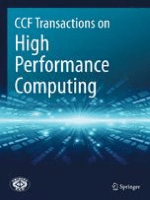
CCF Transactions on High Performance Computing
Catalyzing Innovation in Hardware and Software SystemsCCF Transactions on High Performance Computing, published by SPRINGERNATURE, is an esteemed academic journal dedicated to advancing research in the field of high-performance computing. With an ISSN of 2524-4922 and E-ISSN of 2524-4930, this journal provides a platform for disseminating innovative findings, methodologies, and technologies that shape computational practices within various domains. Operating from Germany, it serves a global audience, reinforcing its impact through an impressive categorization in the Q3 quartile across multiple fields, including Computer Science Applications and Information Systems. The journal, which covers research from 2019 to 2024, plays a crucial role in bridging gaps between theory and practical implementation in hardware architecture and software systems. Although it is not an open-access journal, its contributions are invaluable for researchers, professionals, and students invested in the continuous evolution of high-performance computing. With Scopus rankings that highlight its relevance and influence in the academic community, CCF Transactions on High Performance Computing remains a key resource for the latest developments in this dynamic and rapidly evolving discipline.